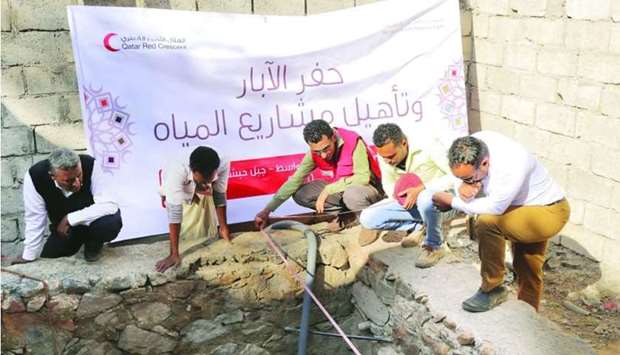The Qatar Red Crescent Society (QRCS) announced Sunday that it recently launched a new project to dig wells and rehabilitate water projects in Yemen.
About 120,000 people in five governorates – Taiz, Al-Dhalea, Saada, Hajjah, and Rayma – will benefit from the project, with a total cost of $1,097,870.
In a statement, the QRCS said this project came to expand access to clean drinking water and to meet the needs of the most vulnerable communities in Yemen as well as providing more support to service institutions.
During the inauguration ceremony of the project in Taiz Governorate, representative of the committee in Dabaa al-Dakhil of Al-Shamayatayn district, Mamoun Abdul Karim Mohamed, said: "We thank the Qatar Red Crescent for its intervention and its response to the humanitarian need of the people in Dabaa Al-Dakhil.
“We rehabilitate the well (Al-Lus) with the support of our people in Qatar, and about 1,000 people will benefit from it.
“It is decided that the well will be deepened, maintained and linked to a local water distribution network, to alleviate the suffering of the people, especially with the scarcity of water in the winter season.”
Project manager Engineer Yunus al-Ariqi said that the project will carry out drilling and rehabilitation works for 53 manual wells, in addition to installing solar-powered pumps, building and rehabilitating 15 water tanks with a capacity of 50 cu m, and rehabilitating 73 wells.
The required needs will be provided as a contribution from the QRCS.
The depth of the hand wells in the Yemeni countryside is between 25-30m, with some of them providing drinkable water and others, in the coastal areas, with salt water.
Water projects in rural areas have been suspended due to the increase in the number of displaced people fleeing conflict areas to the countryside, the successive failures of the pumps of artesian wells, the worn-out and damaged pipes, the weakness of water in the wells, and the high prices of petroleum products in light of the economic crisis.
According to the UN annual needs document 2019, more than half of Yemen's districts are in urgent need of support in the field of sanitation, and more than 55% of the population in 197 districts cannot access any source of safe drinking water.
With limited access to safe drinking water, local communities are resorting to unsafe water sources; only 24% of families treat water at home.
The response continues to focus on supporting the infrastructure and rehabilitating the existing water and sanitation networks, to prevent the spread of epidemic diseases such as cholera, diphtheria, dengue fever, and scabies.
It is worth mentioning that the QRCS has previously completed a similar project for digging hand wells and rehabilitating water projects, a total of 34 manual wells in eight directorates in Taiz and Al-Hodeidah governorates.
That project cost $400,000 – funded by donations of philanthropists in Qatar – and benefits about 35,000 people.
About 120,000 people in five governorates – Taiz, Al-Dhalea, Saada, Hajjah, and Rayma – will benefit from the project, with a total cost of $1,097,870.
In a statement, the QRCS said this project came to expand access to clean drinking water and to meet the needs of the most vulnerable communities in Yemen as well as providing more support to service institutions.
During the inauguration ceremony of the project in Taiz Governorate, representative of the committee in Dabaa al-Dakhil of Al-Shamayatayn district, Mamoun Abdul Karim Mohamed, said: "We thank the Qatar Red Crescent for its intervention and its response to the humanitarian need of the people in Dabaa Al-Dakhil.
“We rehabilitate the well (Al-Lus) with the support of our people in Qatar, and about 1,000 people will benefit from it.
“It is decided that the well will be deepened, maintained and linked to a local water distribution network, to alleviate the suffering of the people, especially with the scarcity of water in the winter season.”
Project manager Engineer Yunus al-Ariqi said that the project will carry out drilling and rehabilitation works for 53 manual wells, in addition to installing solar-powered pumps, building and rehabilitating 15 water tanks with a capacity of 50 cu m, and rehabilitating 73 wells.
The required needs will be provided as a contribution from the QRCS.
The depth of the hand wells in the Yemeni countryside is between 25-30m, with some of them providing drinkable water and others, in the coastal areas, with salt water.
Water projects in rural areas have been suspended due to the increase in the number of displaced people fleeing conflict areas to the countryside, the successive failures of the pumps of artesian wells, the worn-out and damaged pipes, the weakness of water in the wells, and the high prices of petroleum products in light of the economic crisis.
According to the UN annual needs document 2019, more than half of Yemen's districts are in urgent need of support in the field of sanitation, and more than 55% of the population in 197 districts cannot access any source of safe drinking water.
With limited access to safe drinking water, local communities are resorting to unsafe water sources; only 24% of families treat water at home.
The response continues to focus on supporting the infrastructure and rehabilitating the existing water and sanitation networks, to prevent the spread of epidemic diseases such as cholera, diphtheria, dengue fever, and scabies.
It is worth mentioning that the QRCS has previously completed a similar project for digging hand wells and rehabilitating water projects, a total of 34 manual wells in eight directorates in Taiz and Al-Hodeidah governorates.
That project cost $400,000 – funded by donations of philanthropists in Qatar – and benefits about 35,000 people.

